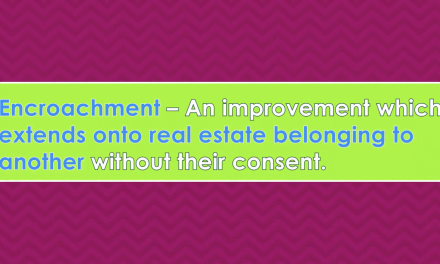What is an encumbrance?
Encumbrances are defined as a claim or lien on title to a parcel of real estate.
Real estate encumbrances include:
- taxes;
- assessments;
- covenants, conditions and restrictions (CC&Rs); and
- all liens, voluntary or involuntary, attached to the real estate. [Calif. Civil Code §1113, 1114]
Encumbrances are the subject of the implied warranty against encumbrances in the grant deed, since they burden title and depreciate its value. [See RPI Form 404]
Encumbrances include:
- CC&Rs, such as restrictions running with the land;
- building restrictions;
- a reservation of a right of way;
- an easement;
- an encroachment;
- a lease; and
- a pending condemnation action. [Evans, supra]
Covenants restricted or limited
To avoid liability arising out of the implied covenants in a grant deed, the deed needs to state the title conditions (encumbrances) created by the seller during their ownership. These conditions are or are not agreed to by the buyer in the purchase agreement.
The implied covenants in a grant deed are waived by the buyer and do not apply when the seller and buyer agree to the contrary in the purchase agreement. In this instance, the buyer and seller list all the title changes made by the seller in the grant deed.
Covenants personal to the grantor/grantee
Implied covenants are only for the personal benefit of a buyer, not future owners, referred to as remote grantees. The implied covenants in a seller’s grant deed to a buyer do not impose a condition on title and do not run with the land.
Thus, being personal to the seller and buyer, the implied covenants in a grant deed may only be enforced by the grantee named in the deed. Implied covenants cannot be enforced by future remote grantees who acquire the buyer’s interest at a later date.
Conversely, covenants running with the land, such as CC&Rs and easements, bind all future owners (remote grantees) of the property. Covenants running with the land are binding on future owners whether they take title by deed or court order as covenants running with the land affect title.
For a covenant to run with the land and affect all remote grantees, the seller creating the covenant needs to state in their conveyance that successors (remote grantees) are bound by the covenants and restrictions imposed on the property as contained in the deed. [CC §1468]
Purchase agreement merges into deed
Title conditions bargained for and agreed to in the buyer’s purchase agreement are merged into the grant deed accepted by the buyer on closing. [See RPI Form 150]
Thus, when a title condition, such as a reservation of an easement by a seller, is agreed to in the purchase agreement, it is to be restated in the grant deed if the condition is to become enforceable by the seller.
The title condition agreed to in the purchase agreement is extinguished on closing by the merger of the bargained for title condition into the grant deed. Thus, the grant deed becomes the sole remaining basis for enforcement of either the buyer’s or seller’s right to title.
After closing, a purchase agreement provision affecting title is only enforceable if it is implied or stated in the grant deed.
However, if a title condition, covenant or CC&R is agreed to in the purchase agreement, but is erroneously omitted when escrow prepares the grant deed, the grant deed can be ordered corrected by a court, a legal process called reformation.
Once the grant deed is corrected to include the omitted title condition, the condition is then enforceable since it is present in the grant deed. [CC §3399]
Conveying lesser estates than the fee
If the buyer of real estate receives an ownership interest less than fee simple, the grant deed needs to explicitly state the lesser interest being conveyed to the buyer.
For example, to convey a life estate, the grant deed states the grantee is to hold the property until the grantee’s (or some other individual’s) death, at which point the title will revert back to the grantor or the grantor’s successor.
Quitclaim deeds: you have what I had
A quitclaim deed terminates whatever interest – if any – the grantor may hold in the real estate described in the deed.
Unlike a grant deed, a quitclaim deed does not carry with it the implied covenants contained in the grant deed. A quitclaim deed operates to release to the grantee all interest the grantor may hold in the property. [Platner v. Vincent (1924) 194 C 436]
Thus, a quitclaim deed passes whatever the title, legal or equitable, the grantor possessed when signing and delivering the quitclaim deed, activity known as execution.
While a quitclaim deed is not intended to assure the conveyance transfers full fee simple ownership, the grantor who holds fee title and signs and delivers a quitclaim deed conveys fee simple ownership of the property, including all the benefits of holding fee simple title. [Spaulding v. Bradley (1889) 79 C 449]
History behind the word
The word encumbrance first originated in the 1300s with a definition of “trouble, difficulty; ensnarement, temptation.” It comes from the Old French word encumbrance meaning “obstruction, calamity, trouble.”














